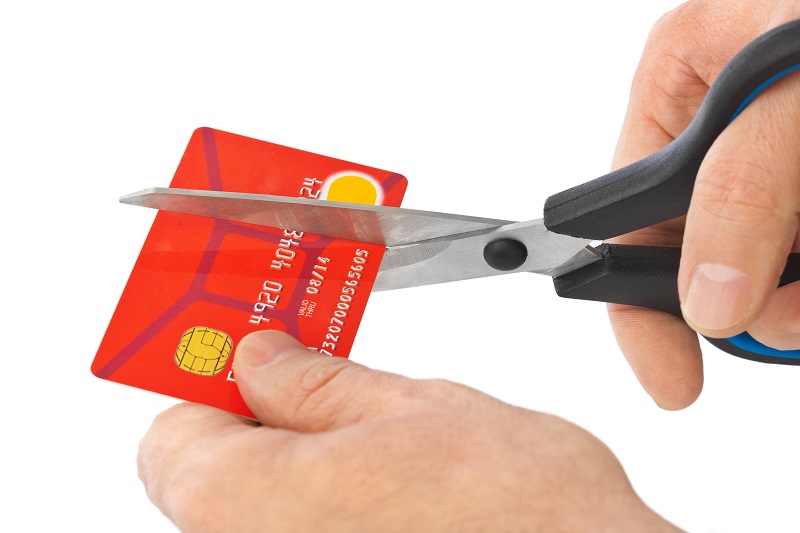How to Stop Spending Money: 7 Tips and Tricks to Curb Your Overspending
By Debra Pangestu
 Have you ever started off the month with the best of intentions to save money – buying only what you need, steering clear of the sales displays, and trying to watch your spending? And then, despite your best efforts, it just seems to happen. Before you know it, you've spent more money than you wanted to. Don't beat yourself up, it happens to many of us, so before you get your next credit card statement and wonder how to stop spending money, read on for some of the best tips around!
Have you ever started off the month with the best of intentions to save money – buying only what you need, steering clear of the sales displays, and trying to watch your spending? And then, despite your best efforts, it just seems to happen. Before you know it, you've spent more money than you wanted to. Don't beat yourself up, it happens to many of us, so before you get your next credit card statement and wonder how to stop spending money, read on for some of the best tips around!
There are many reasons why we overspend. It could be because we aren’t aware of our true spending habits. Maybe we are guestimating our income, expenses, debt payments and spending incorrectly. Then in the end our bank account balance dips lower than what we expect. Whatever the reason, if you’re ready to take control of your finances, these seven tips will help you keep your spending in check.
Jump to what interests you most and where you want to start:
1. Understand Your Spending Triggers
3. Stick to Cash and Stop Relying on Credit Cards
4. Forget Your Credit Cards - Literally and Figuratively
5. Set Short-Term Financial Goals
1. Understand Your Spending Triggers
In many cases, knowing how to stop spending money has to do with identifying the emotional and psychological triggers that cause us to spend. If you remove those triggers, you’ll remove the temptation and opportunity to overspend. So the next time you head out the door, keep these in mind:
Time of Day
Do you find that you have more energy during certain periods of the day? If so, shop during times when you have more energy and feel less stressed. You’ll make wiser spending choices and think more rationally when you’re relaxed and less pressured.
Environment
Are there certain environments that make you want to spend, or make you feel obligated to spend just because you’re there? Craft fairs, shopping malls, home shows, and even when you’re on holidays are all prime examples of times when you’re more likely to spend impulsively. So, take away the temptation by either steering clear of such environments, or only taking a few dollars with you.
Likewise, if you have a favorite store and you find yourself wandering through the aisles looking for great deals, do all you can to limit your opportunities to go there. If going to your favorite store is unavoidable, keep your money – and credit cards -- safe from yourself (see more about this later).
Mood
Different moods and emotional states can alter our energy resources, making us more prone to impulse shopping. For example, if we’re upset, stressed or anxious we may seek some retail therapy to feel better. But instead of hitting the mall or your favorite internet shopping site, hit the gym or the park. Going for a walk or doing some exercise will do wonders for lifting up your mood. Other moods can tint your shopping with rose coloured glasses, and everything begins to look like a great deal.
What’s important is that you identify the moods that affect your spending behaviour, and to find ways to avoid shopping during moods that will cause you to impulse buy.
Peer Pressure
 Do you tend to spend more money than you normally would when you’re hanging out with your friends? Even the most well-intentioned friends can be a bad influence on us, especially if they have bad spending habits themselves. If you can’t afford to eat, shop, and vacation the way your friends do, it’s okay to decline their invites.
Do you tend to spend more money than you normally would when you’re hanging out with your friends? Even the most well-intentioned friends can be a bad influence on us, especially if they have bad spending habits themselves. If you can’t afford to eat, shop, and vacation the way your friends do, it’s okay to decline their invites.
Instead, suggest plans that won’t require you to shell out a lot of money. Meeting for coffee instead of brunch, exploring new hiking trails instead of checking out the latest concert, or having a potluck dinner at home instead of going out to a restaurant are a few money saving tips worth considering. You won’t be able to splurge on expensive vacations or fancy dinners, but you can still enjoy a fun social life without shelling out a lot of money.
Don’t be scared to let your friends know that you’re trying to spend less; perhaps they’ll help you on your journey, and some may even follow suite! What’s important is that you surround yourself with friends who will support you as you work toward your financial goals.
Lifestyle
If you’re accustomed to a certain lifestyle, it could be difficult to give up when you suddenly encounter a financial hardship. But, if your lifestyle ends up becoming bigger than your budget and you don’t know how to stop overspending your budget, you could end up in worse shape.
Your upbringing also has an effect on your lifestyle choices. If you grew up in a household where money was always tight, you may feel the urge to overspend to compensate for all the things you were deprived of growing up. Similarly, if you grew up in a household where money wasn’t an issue, you may feel compelled to spend money you don’t have in order to maintain the lifestyle you grew up with.
The easiest way to start living within your means is to create a budget, and to stick to it. You may have to sacrifice some creature comforts, but it will be worth it when you see your bank balance coming out of the red.
2. Track Your Spending
The littlest purchases can really add up, and by the time the end of the month rolls around, we can be facing a dwindling bank account and severe buyer’s remorse. Tracking your expenses is the key to successful budgeting, because it keeps you accountable for every dollar you’re spending. Once you’re aware of where your money is going, you’ll be in a better position to make smarter spending choices and to identify areas you can cut back in.
Many consumers start by tracking the bigger expenses, but it’s just as important to pay attention to those small, daily purchases. A morning latte, those lunches out, picking up a lottery ticket, or grabbing a magazine from the grocery checkout line can add up more than you think they would, and they can affect our budget in big ways.
If you can cut down as little as $4.00 a day, which is equivalent to your morning latte or your breakfast bagel sandwich, it’ll add up to over $100 a month!
3. Stick to Cash and Stop Relying on Credit Cards
It’s more convenient to whip out a credit card to pay for a purchase than it is to count out a wad of bills, but this convenience is one of the reasons behind many people’s overspending. The downside of credit cards is the ease with which you can overspend; when we’re nonchalantly handing over our card to make a purchase, we’re often not aware of how much everything will add up at the end of the month.
With cash, you physically see how much you have, and how much of your funds are diminishing with each purchase. By paying only in cash, you’re forcing yourself to only spend what you have. So, give your credit cards a break and try to stick to a cash-based system to see if it will curb your spending habits. Based on your budget, take out some cash at the start of the week and put it in an envelope, which will act as your ATM for the week. Draw out a few bills here and there to cover your purchases, and if you find yourself running low on cash, you’ll have to figure out a way to make your money stretch.
By paying with cash, you’ll learn how to stop relying on credit and you’ll know how to stop spending money you don’t have. The cash envelope system will also encourage you to become more creative and resourceful. If you overspend and you don’t have enough to go out to dinner with your friends, you’ll have to figure out different ways of saving money, or think of budget-friendly ways to spend time with your friends.
4. Forget Your Credit Cards – Literally and Figuratively
 When you head out to the mall or the grocery store, take only the amount of cash you anticipate you’ll need and leave the credit cards at home. Unless you know for certain you are going to buy something using the card and you have a plan to pay it off, there is no need to take your credit cards with you. By doing this, you avoid the temptation of using the card for a spur of the moment purchase, which is often the fastest way to find yourself in debt.
When you head out to the mall or the grocery store, take only the amount of cash you anticipate you’ll need and leave the credit cards at home. Unless you know for certain you are going to buy something using the card and you have a plan to pay it off, there is no need to take your credit cards with you. By doing this, you avoid the temptation of using the card for a spur of the moment purchase, which is often the fastest way to find yourself in debt.
If you’re an online shopper, having your credit card information saved onto your shopping profile certainly is convenient, but it’s also easier to fall prey to impulse purchases. All it takes is a click, and you’ll be a few pairs of shoes richer but a hundred dollars poorer. Deleting your credit card numbers makes it slightly less convenient to make purchases, and in the few minutes you’re reaching for your wallet and taking out your credit card, you may decide that you really don’t need that item.
If you already know your credit card numbers off by heart, cancel your current cards and request new ones. Then, go through your favorite shopping accounts and remove your saved information so you can avoid the temptation of purchasing with a single click.
5. Set Short Term Financial Goals
Setting some attainable, short-term financial goals is a great way to stay motivated as you alter your spending habits. Having these goals will constantly remind you of the reasons you’re cutting back on expenses and making a few sacrifices.
And, it’s important that your goals are specific. A generic goal like “decrease spending on eating out” isn’t going to cut it. Quantifiable goals, such as “I will decrease my spending on eating out from $200 a month to $100 a month” gives you a target to aim for, so you’re not shooting in the dark.
Some short term goals that can shift how you view and use money include: saving 10% of each paycheque into a separate account; sticking to a cash budget for three weeks; bringing lunch to work every day for a month instead of eating out. Regardless of what your goals are, it’s important that you keep them simple, make them attainable, and post them somewhere visible to remind you of what to aim for.
6. Learn How to Budget Money
Not having a spending plan can be a big reason a lot of people can’t seem to stop spending money. If we don’t know how much we take home each month and how much our expenses add up to, we’ll continue to buy what we think we can afford, only to realize at the end of the month that our bank account isn’t as plush as we thought. To solve this, it’s important that you learn how to budget money.
So, take a look at what you bring in compared to what you spend. Start by adding up all your sources of income, then tally up all your fixed expenses, such as car payments, rent, debt repayments, etc. Since these values are fixed, it’s easier to budget around them. Then list your variable spending, such as groceries, gas and entertainment, allocating funds to each category based on how much you’ve normally spent in the past.
Seeing how much you spend on entertainment, eating out, clothing, and other non-essentials can be a major wake up call. If you’re spending more than you earn, you’ll have to reign in things a bit. Here are more budgeting tips to keep in mind.
Try testing out your budget. For the next month, track how much you spend and compare the value with what you’ve allocated in your budget, adjusting your numbers for the next month accordingly. This will make it easier for you to stick to your budget.
This budgeting spreadsheet can help you get started, and it will make the budgeting process a lot easier.
7. Give Every Dollar a Job
To curb your overspending habits, try to zero out your accounts. And no, we don’t mean spending everything in your account until you reach zero. Instead, find a home for every dollar in your budget so you’re not tempted to make thoughtless purchases by thinking “if I have the money sitting around, I’ll spend it.”
Allocating your money into smaller categories gives you the information you need to make good spending decisions. For example, if you see $500 in your checking account, you may get the idea that you’re flush with cash so you’ll happily shell out $100 for dinner at one of the city’s finest restaurants and another $100 on a new wardrobe. But once the bills come in a few weeks later, you realize you don’t quite have enough for rent, utilities and car payments.
To avoid this, immediately start telling your money where to go once you deposit your paycheque: pay all of your bills first, then move the remainder to other accounts, such as a savings account or your retirement fund. By ensuring that every dollar has a home, you’ll be less likely to spend away your entire paycheque. To make things easier, you can set up an automatic transfer on payday to divvy up your paycheque into separate accounts, so you won’t be tempted to spend it.
By proactively deciding what you want your money to do and where it should go, your financial awareness increases. And, having that awareness goes a long way in helping you make smarter financial choices.
Learning How to Stop Spending Money is Hard, But It Is Possible
It takes time and dedication to stop overspending and to reform your spending habits, and every now and then the urge to swipe your card will rear its ugly head. This happens to all of us, so don’t be hard on yourself; no one can completely reform their bad habits overnight. Once you know how to budget and you set some goals and safeguards in place, in time you’ll become a savvy consumer who knows how to stop spending money and use it wisely instead.
Related Reading:
Manage Stress to Avoid Overspending
10 Reasons Why You Should Save Money

Comments
Money Managemen... replied on Permalink
Money Management Advice